
Donald Duck: Goin' Quackers is a 2000 platform game developed and published by Ubi Soft for various consoles and Windows-based personal computers. A version with the same title was released for the Game Boy Color, before it was retitled Donald Duck Advance for the Game Boy Advance. Reviews praised the music, backgrounds and animations, noting the short length and low difficulty as more fun for children.
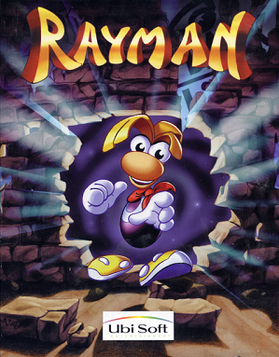
Rayman is a 1995 platform video game developed by Ubi Pictures and published by Ubi Soft. The player controls Rayman, who must pursue Mr Dark to recover the Great Protoon that used to keep the balance between nature and the people of Rayman's valley. The player must navigate the valley, defeat enemies with abilities gained throughout the game, and free captured Electoons, also encountering a boss at the end of each thematic world.

Tonic Trouble is a 1999 action-adventure game developed by Ubi Soft Montreal and published by Ubi Soft. The game follows janitor Ed, who drops a container of unidentified fluid from his spaceship to Earth, transforming the planet into a mutated version of itself. Drunkard Grögh drinks from the container and is granted powers that lead him to conquer Earth. Assuming the role of Ed, the player is tasked with solving puzzles and defeating enemies to acquire the tools to conquer Grögh and repossess the container to create an antidote.

Mega Man Xtreme is a 2000 action-platform game developed by Capcom for the Game Boy Color handheld console. It is a spin-off title in the Mega Man X series of video games that originated on the Super Nintendo Entertainment System. Mega Man Xtreme takes place within the series timeline during the 22nd century, in which a group of "Maverick" androids called the "Shadow Hunters" hack into the world's "Mother Computer" system, destabilize all of the networks, and allow other Mavericks to cause rampant destruction all over the world. The heroic "Maverick Hunter" X is tasked with going into cyberspace to relive his past missions and put a stop to the group's plans.
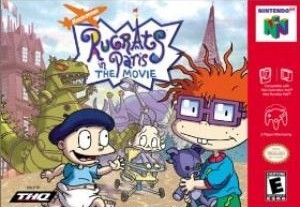
Rugrats in Paris: The Movie is a video game based on the 2000 animated movie of the same name. The game follows the adventures of the Rugrats in a European theme park. A console version of the game was released in 2000, for the PlayStation, Nintendo 64, and a handheld version for Game Boy Color. A version for Microsoft Windows was later released in 2001. The console version's gameplay is similar to Rugrats: Studio Tour, but Paris’ attractions sometimes have minigames too. The handheld gameplay is a side-scrolling platformer. The Windows version's gameplay is an adventure game in which the player must find Chuckie's Wawa Bear.

Batman Beyond: Return of the Joker, known as Batman of the Future: Return of the Joker in Europe, is a scrolling beat 'em up video game developed by Kemco and released by Ubi Soft for the Game Boy Color, PlayStation and Nintendo 64 in 2000 and 2001. The game is based on the film of the same name, which in turn was based on the TV series Batman Beyond. Players act as the new Batman Terry McGinnis, who takes over the position of the retired Bruce Wayne and fights against the Jokerz gang led by the recently revived Joker. Throughout the game, Batman fights the villain's cronies, who steal tech components from various laboratories and corporations in Gotham City. Joker uses them to take control of a missile-shooting satellite, which he plans to destroy the entire city with.
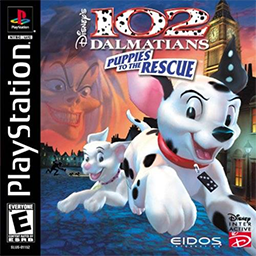
102 Dalmatians: Puppies to the Rescue is a 2000 platform game loosely based on the 2000 film 102 Dalmatians. It was developed by Toys for Bob and published by Eidos Interactive for PlayStation and Dreamcast, while Disney Interactive published the Windows version. The Game Boy Color version was developed by Digital Eclipse and published by Activision.

Power Rangers Lightspeed Rescue is a video game based on the 8th season of the TV series Power Rangers Lightspeed Rescue. Four distinct versions of the game were produced for Mac OS/Windows, Game Boy Color, Nintendo 64, and PlayStation.

Tomb Raider: The Prophecy is a 2002 action-adventure video game developed by Ubi Soft Milan and published by Ubi Soft for the Game Boy Advance. Part of the Tomb Raider series, it follows protagonist Lara Croft as she explores multiple temples in search of keys to a world-destroying power. Gameplay features exploration, combat and platforming displayed from a top-down isometric perspective.

Mission: Impossible is an adventure video game based upon the Mission: Impossible film series. It was developed by Rebellion Developments and published by Infogrames for the Game Boy Color in 2000.
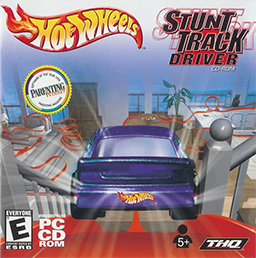
Hot Wheels Stunt Track Driver is a racing video game developed by Semi Logic Entertainments and published by Mattel Media for Microsoft Windows. It is based on the Hot Wheels toy franchise, and was released on October 15, 1998. A Game Boy Color version, developed by Lucky Chicken Games, was released in 2000.

Burai Fighter is a shoot 'em up video game developed by KID for the Nintendo Entertainment System. The game was released in North America by Taxan in March 1990, PAL regions by Nintendo in 1990, and Japan by Taito on July 20, 1990. The game was ported to the Game Boy and retitled as Burai Fighter Deluxe, and was released in Japan on June 27, 1990, in North America in January 1991 and in Europe in 1991; this port was released for the Game Boy Color as Space Marauder, originally released in Japan as Burai Fighter Color, as the original Game Boy version is not compatible with the later models.
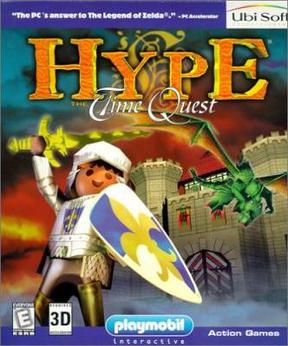
Hype: The Time Quest is an adventure video game developed by Ubi Soft Montreal and published by Ubi Soft and was released under the Playmobil Interactive series of products. The game, released in the year 1999 along with Alex Builds His Farm (1999), is based on the medieval castle toy series from Playmobil. The U.S. version of the Game Boy Color version was supposed to be released in June 2000, but was delayed for over a year. The game revolves around Hype, a 22-year-old knight in the service of King Taskan IV, following a quest through time to return to his own time in order to save the kingdom from the evil black knight Barnak. Hype's adventures therefore take place in the same kingdom throughout four different periods of its history. The game was directed by Alain Tascan and featured thirty-two different voice actors, as well as original music by Robbi Finkel. The Game Boy Color version was one of a number of Ubi Soft games for the platform that utilized the "Ubi Key" feature, allowing players to share data between different games via the system's infrared port and unlock extra content.

Dexter's Laboratory: Robot Rampage is an action video game published by Bay Area Multimedia for the Game Boy Color and released in the United States on November 28, 2000. It is a graphically redesigned version of the game Elevator Action EX, also developed by Altron, with characters from the American animated television series Dexter's Laboratory from Cartoon Network.

Tarzan is a 1999 platform video game developed by Eurocom Entertainment Software. Based on the 1999 film of the same name, it was released by Sony Computer Entertainment on the PlayStation and Disney Interactive on Microsoft Windows on June 30, 1999, and by Activision on Nintendo 64 in February 15, 2000. An abridged version for the Game Boy Color developed by Digital Eclipse was released in 1999.

Gold and Glory: The Road to El Dorado is an adventure video game developed by Revolution Software. An adaptation of the film The Road to El Dorado, it was released on Game Boy Color, Microsoft Windows and PlayStation.

The Wild Thornberrys: Rambler is an action adventure game based on Nickelodeon's The Wild Thornberrys animated television series. The game was developed by Vicarious Visions and published by Mattel Interactive. It was released for Microsoft Windows in August 2000 and Game Boy Color in November 2000.
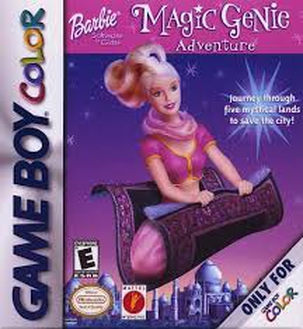
Barbie: Magic Genie Adventure is a single-player adventure/action game developed by Vicarious Visions and published by Mattel Interactive. It was released on the Game Boy Color on November 1, 2000.
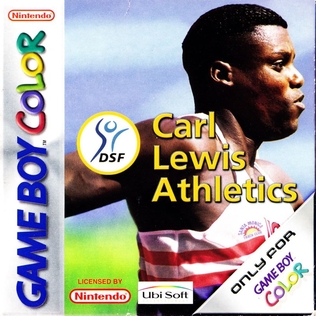
Carl Lewis Athletics 2000 is a 2000 video game developed by Planet Interactive Development and published in Europe by Ubi Soft for the Game Boy Color. Based on the brand of American athlete Carl Lewis, the game is a track and field sports game in which players compete in various decathlon events.



















